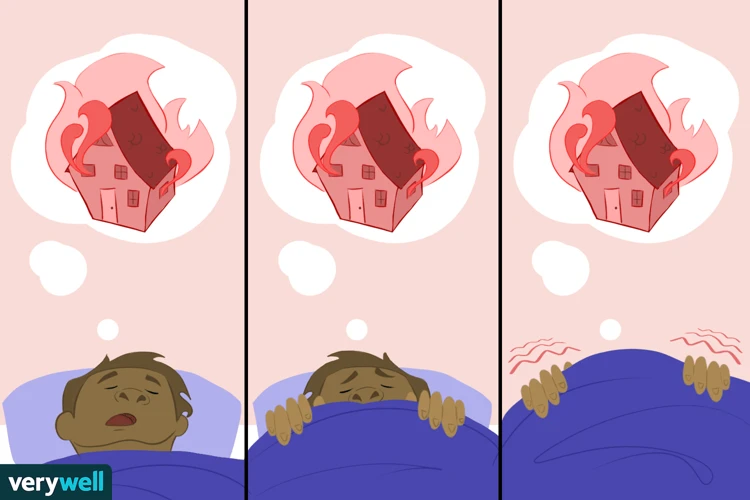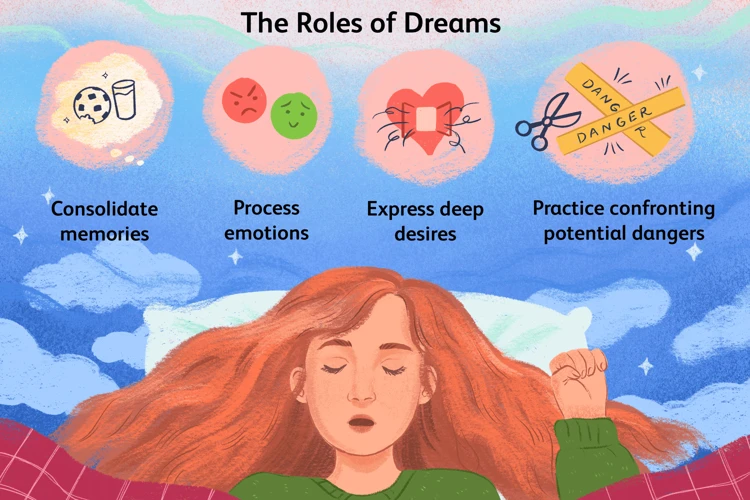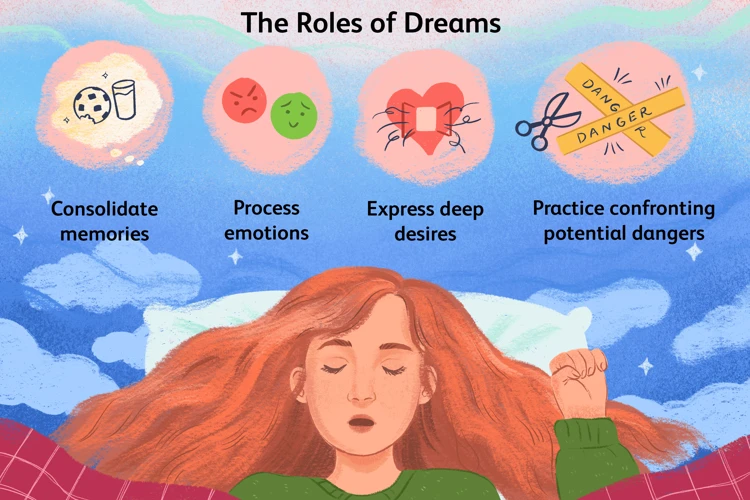Nightmares have long been a topic of intrigue and fascination. While occasional bad dreams are a common occurrence, recurring nightmares can have a profound impact on one’s mental health. The relentless and vivid nature of these dreams can lead to a range of psychological issues, including increased anxiety, disrupted sleep patterns, and emotional distress. Understanding the link between recurring nightmares and mental health is crucial in order to address and alleviate the negative effects they can have. In this article, we will delve into the causes, consequences, and coping mechanisms associated with recurring nightmares, shedding light on their psychological toll and offering guidance for those seeking relief from this distressing phenomenon.
What are Recurring Nightmares?

Recurring nightmares are a type of dream that repeat themselves over a period of time with similar themes, content, or emotional intensity. They often involve distressing or terrifying situations, which can cause an individual to wake up feeling frightened or anxious. These nightmares tend to be vivid and realistic, making it difficult for the dreamer to distinguish between the dream world and reality. The frequency of recurring nightmares can vary, with some individuals experiencing them sporadically while others may have them on a nightly basis. While the exact causes of recurring nightmares are still not fully understood, they are believed to be influenced by a combination of psychological and physiological factors. Some researchers suggest that recurring nightmares may serve as a reflection of unresolved emotional conflicts, trauma, or stress in a person’s life. Others propose that they may be the mind’s way of processing and preparing for potential threats or challenges. Exploring the themes and content of recurring nightmares can offer valuable insight into the subconscious mind and its symbolic representations. Understanding the nature of recurring nightmares is essential in order to decode their meanings and address any underlying psychological issues that may be contributing to their occurrence. To learn more about the themes and meanings associated with recurring dreams, you can explore relevant articles that delve deeper into this topic.
The Psychological Toll

Recurring nightmares can take a significant psychological toll on individuals, affecting various aspects of their mental well-being. One of the primary impacts is the increase in anxiety levels. The distressing and repetitive nature of these nightmares can lead to heightened feelings of fear, unease, and apprehension, even when awake. This constant state of heightened anxiety can have a detrimental effect on daily functioning and overall quality of life. Additionally, recurring nightmares can disrupt sleep patterns, leaving individuals feeling exhausted and fatigued. The lack of restful sleep can impair cognitive function, mood regulation, and overall mental clarity. The emotional distress caused by recurring nightmares can lead to a sense of helplessness, sadness, and even despair. Individuals may experience difficulty in coping with and managing their emotions, which can further exacerbate the negative impact on their mental health. Understanding the psychological toll of recurring nightmares is essential in order to seek appropriate support and implement effective coping strategies. To explore theories and interpretations related to recurring dreams, you can refer to relevant articles and gain further insight into their psychological role and significance.
1. Increase in Anxiety
An increase in anxiety is one of the significant psychological tolls that recurring nightmares can have on an individual. These nightmares can induce a sense of fear and unease that extends beyond the dream state, causing heightened anxiety levels even during waking hours. The distressing content of recurring nightmares can trigger a cascade of negative emotions, leading to an ongoing state of worry and apprehension. As a result, individuals may experience symptoms such as persistent feelings of restlessness, irritability, and an inability to relax. The anxiety provoked by recurring nightmares can also impact daily functioning, including impairments in concentration, decision-making, and overall productivity. The link between recurring nightmares and anxiety is complex and multifaceted, influenced by various factors such as past traumas, unresolved conflicts, and underlying mental health conditions. Addressing and managing anxiety caused by recurring nightmares is crucial for improving overall quality of life. To gain a deeper understanding of the role of recurring dreams in psychological interpretation, you can explore relevant resources here.
2. Disrupted Sleep Patterns
Disrupted sleep patterns are a common consequence of recurring nightmares. When someone experiences recurring nightmares, their quality of sleep is often significantly compromised. The intense and distressing nature of these dreams can cause individuals to wake up frequently throughout the night, leading to fragmented sleep. As a result, they may find it difficult to fall asleep or stay asleep, resulting in overall sleep deprivation. The lack of restorative sleep can have numerous detrimental effects on one’s physical and mental well-being. It can lead to daytime fatigue, difficulty concentrating, and impaired cognitive function. Additionally, disrupted sleep patterns can exacerbate existing mental health conditions or contribute to the development of new ones. It is vital to address and manage the underlying cause of recurring nightmares in order to restore healthy sleep patterns. Creating a calm and relaxing sleep environment, implementing relaxation techniques before bed, and seeking professional help are all strategies that can aid in managing disrupted sleep patterns caused by recurring nightmares.
3. Emotional Distress
Emotional distress is a significant consequence of recurring nightmares. These distressing dreams can evoke intense emotions such as fear, anxiety, sadness, and helplessness. The vivid and realistic nature of recurring nightmares can make it difficult for individuals to separate the dream from reality, causing lingering emotional turmoil even after waking up. The emotional impact of these nightmares can be long-lasting, affecting the individual’s mood, overall well-being, and daily functioning. People who experience recurring nightmares may find themselves constantly on edge, anticipating the next nightmare and dreading the emotional turmoil it will bring. This chronic emotional distress can lead to a decrease in motivation, difficulty concentrating, and a general sense of unease. It is important to address the emotional toll of recurring nightmares and seek appropriate support and treatment to alleviate the distress. Counseling and therapy can be beneficial in assisting individuals in processing and managing the emotions triggered by these nightmares. Through therapy, individuals can learn coping strategies to reduce the emotional distress associated with recurring nightmares, improving their overall mental well-being and quality of life.
The Link to Mental Health

Recurring nightmares can have a significant impact on mental health, exacerbating existing conditions or leading to the development of new ones. The psychological toll they take can manifest in multiple ways, including increased anxiety, disrupted sleep patterns, and emotional distress. The link between recurring nightmares and mental health is particularly evident in conditions such as Post-Traumatic Stress Disorder (PTSD), where the nightmares may serve as distressing reminders of past traumatic experiences. Additionally, recurring nightmares have been associated with depression and anxiety disorders, further emphasizing their potential to negatively impact mental well-being. It is crucial to address the link between recurring nightmares and mental health in order to provide appropriate support and treatment for individuals experiencing these distressing dreams.
1. Post-Traumatic Stress Disorder (PTSD)
Post-Traumatic Stress Disorder (PTSD) is a mental health condition that can be closely linked to recurring nightmares. PTSD can develop after a person has experienced or witnessed a traumatic event, such as a natural disaster, a serious accident, or physical or sexual assault. One of the hallmark symptoms of PTSD is the re-experiencing of the traumatic event through intrusive thoughts, flashbacks, and nightmares. These nightmares often revolve around the specific details of the traumatic event, and can be highly distressing and vivid. They may cause the individual to wake up in a state of fear, panic, or distress, which can further contribute to sleep disturbances and increased anxiety. The experience of recurring nightmares can intensify the symptoms of PTSD, as the individual is constantly being reminded of the traumatic event and may struggle to find relief from the associated emotions. Seeking therapy and treatment for PTSD is crucial in order to address the underlying trauma and develop effective coping mechanisms to manage the recurring nightmares and their impact on mental health.
2. Depression
Depression is a serious mental health condition that can be closely linked to recurring nightmares. For individuals who already experience depression, recurring nightmares can exacerbate their symptoms and contribute to a vicious cycle of negative emotions. The distressing and often unsettling content of these nightmares can evoke intense feelings of sadness, hopelessness, and despair, mirroring the emotional landscape of depression. The disrupted sleep patterns caused by recurring nightmares can lead to fatigue and further exacerbate depressive symptoms. The constant intrusion of distressing dreams into one’s sleep can leave individuals feeling emotionally drained and lacking in motivation. Additionally, the fear and anxiety associated with recurring nightmares can increase feelings of worthlessness and self-doubt, common aspects of depression. It is essential for individuals experiencing both depression and recurring nightmares to seek professional help. Therapies such as cognitive-behavioral therapy (CBT) and medication can be effective in treating both depression and sleep disturbances. Addressing underlying psychological factors and finding healthy coping mechanisms can help manage both depressive symptoms and the occurrence of recurring nightmares.
3. Anxiety Disorders
Anxiety disorders are a common mental health condition that can be closely linked to recurring nightmares. Individuals who experience recurring nightmares may be at a higher risk of developing or exacerbating anxiety disorders. The chronic and distressing nature of recurring nightmares can significantly increase feelings of anxiety and worry in the waking hours. This heightened anxiety can lead to a range of symptoms associated with anxiety disorders, such as excessive worrying, restlessness, irritability, difficulty concentrating, and sleep disturbances. Recurring nightmares can create a vicious cycle where the anxiety experienced during wakefulness can intensify the frequency and intensity of nightmares, further contributing to anxiety symptoms. Additionally, the fear of having another nightmare can lead to increased vigilance and hypervigilance, making it difficult for individuals to relax and maintain a sense of calm. It’s important to note that while recurring nightmares may be an indication of underlying anxiety disorders, they can also contribute to the development of anxiety disorders in individuals who did not previously have them. Seeking professional help, such as therapy or counseling, is crucial in managing anxiety disorders and addressing the impact of recurring nightmares. The support of mental health professionals can provide guidance in developing coping strategies, stress management techniques, and therapies tailored to the individual’s specific needs.
Causes of Recurring Nightmares

The causes of recurring nightmares can be multifaceted, with various factors contributing to their occurrence. One common cause is traumatic experiences. Individuals who have experienced significant trauma, such as physical or emotional abuse, accidents, or natural disasters, may find themselves plagued by recurring nightmares as their minds attempt to process and make sense of the distressing events. Stress and anxiety are also frequent triggers for recurring nightmares. High levels of stress, whether due to work, relationships, or other life events, can manifest in the form of intense and recurrent nightmares. Additionally, certain medications and substance abuse can disrupt the sleep cycle and increase the likelihood of experiencing recurring nightmares. It is important to note that these causes are not exhaustive, and individual experiences may differ. By identifying and addressing the underlying causes of recurring nightmares, individuals can work towards finding relief and improving their overall mental well-being.
1. Traumatic Experiences
Traumatic experiences can play a significant role in the occurrence of recurring nightmares. These traumatic events can include situations such as accidents, physical or emotional abuse, natural disasters, or witnessing violence. The intense emotions and distress associated with these experiences can leave a lasting impact on the subconscious mind, manifesting in the form of recurring nightmares. These nightmares often feature vivid and distressing reenactments of the traumatic event or related themes. The mind uses these nightmares as a way to process and make sense of the traumatic experience, attempting to work through the associated emotions and fears. It is important to note that not everyone who experiences a traumatic event will develop recurring nightmares, as each individual’s response to trauma is unique. Factors such as the severity of the trauma, the individual’s coping mechanisms, and their support system can all influence the likelihood of recurring nightmares. Seeking therapy or counseling after a traumatic event can be helpful in processing and healing from the trauma, potentially reducing the frequency and intensity of recurring nightmares.
2. Stress and Anxiety
Stress and anxiety are common triggers for the occurrence of recurring nightmares. When individuals are experiencing high levels of stress or anxiety in their waking lives, it can manifest in their dreams during sleep. The brain uses dreams as a way to process and work through emotions, and when stress and anxiety are present, they can infiltrate the dream content, leading to recurring nightmares.
One reason stress and anxiety may contribute to recurring nightmares is because they can disrupt the sleep cycle. When individuals are stressed or anxious, their minds tend to be hyperactive, making it difficult to relax and fall into a deep sleep. This can result in fragmented sleep patterns, with frequent awakenings throughout the night. These awakenings can interrupt the normal progression of sleep stages, including the REM (rapid eye movement) stage where dreams are most likely to occur. As a result, individuals may be more likely to remember their dreams, including recurring nightmares, when they wake up during or after a nightmare episode.
Stress and anxiety can also create a state of hyperarousal in the brain, increasing the likelihood of vivid and intense dreams. The heightened emotional state can intensify the content of nightmares, making them more distressing and memorable. This can create a vicious cycle, where the occurrence of recurring nightmares further exacerbates stress and anxiety, leading to an ongoing cycle of sleep disturbance.
It’s important to note that stress and anxiety can stem from various sources, such as work-related pressure, personal relationships, financial concerns, or traumatic events. Identifying and addressing the underlying causes of stress and anxiety is essential in managing recurring nightmares. Engaging in stress reduction techniques, seeking therapy or counseling, practicing relaxation exercises, and incorporating healthy coping strategies can all help alleviate stress and anxiety levels, potentially reducing the frequency and intensity of recurring nightmares.
3. Medications and Substance Abuse
Medications and substance abuse can also play a role in the occurrence of recurring nightmares. Certain medications, such as antidepressants, antipsychotics, and blood pressure medications, have been linked to an increase in vivid and distressing dreams. This side effect is believed to be caused by the impact these medications have on neurotransmitters in the brain, altering the sleep-wake cycle and dream patterns. Additionally, substance abuse, particularly the use of drugs like alcohol, opioids, and stimulants, can disrupt healthy sleep patterns and contribute to the occurrence of nightmares. These substances can affect the brain’s chemistry and disrupt the normal sleep cycle, leading to more frequent and intense nightmares. It is important for individuals who are experiencing recurring nightmares to discuss their medication regimen with their healthcare provider, as adjusting the dosage or switching to an alternative medication may help alleviate the frequency and intensity of the nightmares. Similarly, seeking help for substance abuse issues through rehabilitation and therapy can also help reduce the occurrence of recurring nightmares. Addressing the use of medications and substance abuse is an important step in managing and preventing the impact of recurring nightmares on mental health.
How to Cope with Recurring Nightmares

Coping with recurring nightmares requires a proactive approach in order to alleviate their impact on mental well-being. One effective method is to establish a relaxation routine before bedtime, incorporating calming activities such as deep breathing exercises, meditation, or listening to soothing music. Another strategy is seeking therapy and counseling, where professionals can help individuals explore and address the underlying causes of their nightmares, providing tools and techniques to manage and overcome them. Medication and alternative treatments, such as hypnosis or acupuncture, may also be considered for those struggling with severe and persistent nightmares. Creating a support network of friends and family, engaging in regular exercise to reduce stress levels, and practicing proper sleep hygiene can further contribute to the management of recurring nightmares. By utilizing a combination of these coping mechanisms, individuals can regain control over their sleep patterns and alleviate the distressing effects of recurring nightmares.
1. Establish a Relaxation Routine
One effective way to cope with recurring nightmares is to establish a relaxation routine. By incorporating relaxation techniques into your daily life, you can create a sense of calmness and promote better sleep. Here are some strategies to consider:
1. Practice Deep Breathing: Deep breathing exercises can help to calm the mind and relax the body. Find a quiet, comfortable space and take slow, deep breaths, focusing on the sensation of the breath entering and leaving your body. This can help to reduce anxiety and promote relaxation before bedtime.
2. Engage in Mindfulness: Mindfulness involves focusing on the present moment without judgment. Incorporating mindfulness practices into your routine, such as meditation or body scans, can help to quiet the mind and reduce stress. You can find guided mindfulness exercises online or use mobile apps that offer meditation and relaxation techniques.
3. Practice Progressive Muscle Relaxation: Progressive muscle relaxation involves tensing and relaxing different muscle groups in the body, helping to release physical tension and promote relaxation. Start by tensing a specific muscle group for a few seconds, then release the tension while focusing on the sensation of relaxation. Repeat this process for each muscle group, starting from your toes and working your way up to your head.
4. Establish a Bedtime Routine: Create a relaxing bedtime routine to signal to your body and mind that it’s time to sleep. This can include activities such as taking a warm bath, listening to soothing music, reading a book, or practicing relaxation exercises. Consistency is key, so try to establish a regular sleep schedule and stick to it as much as possible.
By incorporating these relaxation techniques into your routine, you can create a calm and peaceful environment before sleep, reducing the likelihood of experiencing recurring nightmares. Remember, it may take time and practice to find the methods that work best for you, so be patient and persistent in your efforts to establish a relaxation routine.
2. Therapy and Counseling
Therapy and counseling are essential tools for individuals experiencing the negative impact of recurring nightmares on their mental health. Seeking professional help can provide a supportive and safe environment to explore the underlying causes and emotions associated with these distressing dreams. Here are some approaches that therapists and counselors may use:
1. Cognitive Behavioral Therapy (CBT): CBT is a widely used therapeutic approach that aims to identify and modify negative thought patterns and behaviors. In the context of recurring nightmares, CBT can help individuals challenge and reframe the distressing thoughts and emotions that arise from these dreams. Techniques such as imagery rehearsal therapy may be employed to change the content and outcome of recurring nightmares.
2. Exposure Therapy: Exposure therapy involves gradually exposing individuals to the source of their fears or anxieties in a controlled setting. In the case of recurring nightmares, exposure therapy may involve discussing and exploring the content of the dreams in therapy sessions. By confronting and processing the emotions associated with the nightmares, individuals can gradually reduce the impact of these dreams on their mental well-being.
3. Eye Movement Desensitization and Reprocessing (EMDR): EMDR is a specialized therapy often used to treat trauma-related disorders. It involves bilateral stimulation, such as eye movements or taps, while the individual recalls distressing memories or nightmares. EMDR helps to reprocess these traumatic experiences and reduce the intensity of associated emotions.
4. Dream Analysis: Therapists and counselors may also employ dream analysis techniques to uncover the symbolic meanings and messages behind recurring nightmares. This approach involves exploring the dream content, feelings, and imagery to gain insights into the subconscious mind and the underlying psychological issues that may be contributing to the nightmares.
It is important to note that therapy and counseling approaches may vary depending on the individual’s specific needs and circumstances. A mental health professional can provide personalized guidance and develop a tailored treatment plan to address recurring nightmares and their impact on mental health.
3. Medication and Alternative Treatments
When it comes to coping with recurring nightmares, there are various medication and alternative treatment options available. One potential approach is the use of medication, specifically targeting the underlying causes of the nightmares. This may involve antidepressants or anti-anxiety medications, which can help regulate sleep patterns and reduce the frequency and intensity of nightmares. It’s important to consult with a healthcare professional before starting any medication, as they can provide guidance on the appropriate dosage and potential side effects.
In addition to medication, there are alternative treatments that can be helpful in managing recurring nightmares. Eye Movement Desensitization and Reprocessing (EMDR) therapy is a technique commonly used to treat post-traumatic stress disorder (PTSD), which can be an underlying cause of nightmares. EMDR therapy involves the use of rapid eye movements while recalling distressing experiences, helping to desensitize and reprocess traumatic memories.
Another alternative treatment option is cognitive-behavioral therapy (CBT), which focuses on identifying and changing negative thought patterns and behaviors associated with nightmares. This therapy can help individuals develop coping strategies and relaxation techniques to reduce the impact of recurring nightmares on their mental health.
Mindfulness and relaxation techniques can also be beneficial in managing recurring nightmares. Practices such as meditation, deep breathing exercises, and progressive muscle relaxation can help reduce anxiety and promote a sense of calm before bedtime.
Lastly, exploring creative outlets such as art therapy or dream journaling can provide a means of self-expression and processing emotions related to recurring nightmares.
It’s important to note that what works for one person may not work for another, so a combination of treatments may be necessary to find relief from recurring nightmares. It’s always recommended to seek professional guidance to determine the most suitable approach for individual circumstances.
Preventing Recurring Nightmares
Preventing recurring nightmares is essential in order to improve sleep quality and promote better mental health. Here are some effective strategies that can help minimize the occurrence of these distressing dreams. First and foremost, it is important to manage stress levels. Engaging in relaxation techniques such as deep breathing exercises, meditation, or yoga can help reduce overall stress and anxiety, making it less likely for recurring nightmares to manifest. Creating a calm sleep environment is also crucial. This can be achieved by keeping the bedroom dark, cool, and free from distractions. Using comforting scents or soothing sounds, such as lavender essential oil or calming music, can further promote relaxation and peaceful sleep. Additionally, practicing lucid dreaming techniques may be beneficial. This involves training oneself to become aware that they are dreaming, enabling them to have some control over the dream’s content and steer it towards more positive or neutral experiences. By implementing these preventive measures, individuals can increase their chances of having restful and nightmare-free nights.
1. Manage Stress Levels
Managing stress levels is crucial in preventing and reducing the occurrence of recurring nightmares. Stress has been identified as a major contributing factor to the development of nightmares, as it can disrupt the sleep cycle and increase anxiety levels. To effectively manage stress, individuals can incorporate various coping mechanisms into their daily routine. One effective strategy is to engage in regular physical activity, such as exercise or yoga, as it helps release tension and promotes relaxation. Additionally, practicing relaxation techniques, such as deep breathing exercises or meditation, can help calm the mind and alleviate stress. Creating a healthy work-life balance is also important, as excessive workload and lack of downtime can contribute to increased stress levels. Prioritizing self-care activities, such as engaging in hobbies, spending time with loved ones, or engaging in activities that bring joy and relaxation, can provide a sense of fulfillment and reduce stress. It is also crucial to establish healthy boundaries and learn to say no when necessary to avoid overwhelming oneself. Seeking support from friends, family, or a therapist can also be beneficial in managing stress levels. By actively managing stress, individuals can decrease the likelihood of recurring nightmares and promote overall well-being.
2. Create a Calm Sleep Environment
Creating a calm sleep environment is crucial in preventing recurring nightmares and promoting restful sleep. By making some simple adjustments to your bedroom, you can create an atmosphere that is conducive to relaxation and peacefulness. Start by ensuring that your bedroom is cool, quiet, and dark. Use blackout curtains or an eye mask to block out any unwanted light, as even small amounts can interfere with sleep quality. Consider using earplugs or a white noise machine to drown out any disruptive sounds. Keep your bedroom free from clutter and distractions, as a tidy and organized space can help promote a sense of calm. Choose comfortable bedding and invest in a supportive mattress and pillows to optimize comfort. Additionally, incorporating relaxation techniques before bed can further enhance the calmness of your sleep environment. Engage in activities such as reading a book, practicing gentle stretches, or listening to soothing music to unwind before sleep. Avoid electronic devices, as the blue light emitted from screens can interfere with the production of melatonin, a hormone that helps regulate sleep. By creating a serene and tranquil sleep environment, you can improve the quality of your sleep and reduce the chances of experiencing recurring nightmares.
3. Practice Lucid Dreaming Techniques
Practicing lucid dreaming techniques can be an effective method for managing and potentially preventing recurring nightmares. Lucid dreaming refers to the state of being aware that you are dreaming while still in the midst of the dream. By becoming conscious within the dream, you can exert some control over the dream’s content and direction. This can provide a sense of empowerment and enable you to actively change the course of the dream, potentially transforming a recurring nightmare into a more positive or neutral experience. There are several techniques that can be utilized to enhance lucid dreaming abilities. One approach is reality testing, which involves regularly questioning your reality throughout the day. By developing the habit of questioning whether you are awake or dreaming, you may find that this habit carries over into your dreams, making it easier to recognize when you are dreaming. Another technique is keeping a dream journal, where you write down your dreams immediately upon waking. This can improve dream recall and help you become more familiar with the patterns and symbols that appear in your dreams. Additionally, practicing visualization and affirmations before sleep can help program your subconscious mind to become more aware and responsive during dreams. While lucid dreaming may not completely eliminate recurring nightmares, it offers a way to actively engage with and reshape the dream experience. If you’re interested in learning more about lucid dreaming and its potential benefits, there are resources available that delve into the topic in greater detail.
Conclusion
In conclusion, recurring nightmares can have a significant impact on an individual’s mental health and overall well-being. The persistent and distressing nature of these dreams can lead to increased anxiety, disrupted sleep patterns, and emotional distress. It is important to recognize the link between recurring nightmares and mental health, as they can be a manifestation of underlying psychological issues such as post-traumatic stress disorder (PTSD), depression, and anxiety disorders. While the exact causes of recurring nightmares may vary, they are often influenced by traumatic experiences, high levels of stress and anxiety, and even certain medications or substance abuse. Coping with recurring nightmares can be challenging, but there are several strategies that can help. Establishing a relaxation routine, seeking therapy or counseling, and considering medication or alternative treatments are all viable options for managing and reducing the impact of recurring nightmares. Additionally, preventing recurring nightmares involves managing stress levels, creating a calm sleep environment, and practicing lucid dreaming techniques. By addressing the root causes and implementing coping mechanisms, individuals can gain control over their nightmares and improve their overall mental health and quality of life.
Frequently Asked Questions
1. Can recurring nightmares be a sign of a mental health disorder?
Yes, recurring nightmares can be a symptom of various mental health disorders, such as post-traumatic stress disorder (PTSD), depression, and anxiety disorders.
2. How common are recurring nightmares?
Recurring nightmares are more common than you might think. Studies suggest that approximately 50% of adults experience recurring nightmares at some point in their lives.
3. Are recurring nightmares the same as night terrors?
No, recurring nightmares and night terrors are not the same. Night terrors are intense episodes of fear and agitation during sleep, usually accompanied by screaming or thrashing, while recurring nightmares are distressing dreams that repeat over time.
4. Can medications cause recurring nightmares?
Yes, certain medications can contribute to the occurrence of recurring nightmares. Some antidepressants, antipsychotics, and blood pressure medications have been linked to an increase in vivid dreams and nightmares.
5. Are recurring nightmares more common in children or adults?
Recurring nightmares are more prevalent in children, with studies suggesting that around 30% of children experience recurrent nightmares. However, they can also affect adults of all ages.
6. Can recurring nightmares be inherited?
There is evidence to suggest that a predisposition to experiencing recurring nightmares may have a genetic component. However, environmental factors and life experiences also play a significant role in their development.
7. How can recurring nightmares impact daily life?
Recurring nightmares can have a significant impact on a person’s daily life. They can lead to sleep disturbances, increased anxiety, and emotional distress, which can interfere with daily functioning and overall well-being.
8. Can therapy help in managing recurring nightmares?
Yes, therapy, such as cognitive-behavioral therapy (CBT) and exposure therapy, can be effective in managing and reducing the frequency and intensity of recurring nightmares. These therapeutic approaches aim to identify and address underlying causes and develop coping strategies.
9. Is it possible to prevent recurring nightmares?
While it may not be possible to prevent recurring nightmares entirely, certain strategies, such as stress management, maintaining a calming sleep environment, and practicing lucid dreaming techniques, can help reduce their occurrence and impact.
10. When should I seek professional help for recurring nightmares?
If recurring nightmares significantly interfere with your daily life, cause distress, or are accompanied by other mental health symptoms, it is advisable to seek professional help from a mental health professional who specializes in dream analysis and therapy.








